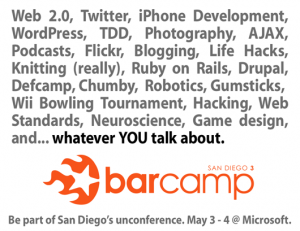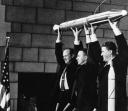I’m way overdue in letting people know about awesome things happening in San Diego, because there are currently too many awesome things happening in San Diego. To apologize, I implore you to attend BarCamp this weekend:
Category Archives: Technology
wanting to be found
It’s difficult to find old high-school friends on the Web. Many of them don’t have any reason to publish pages with bylines or about themselves. It’s even harder when their names have changed since they left school (i.e. most of my friends from that time). That makes it tough to do a casual “where are they now?” search on Google. Social networks like Facebook don’t help much if you’ve been out of school more than a decade, and alumni-finder sites tend to be horrible little pay-for-everything silos.
I realize that many people probably don’t want to be found under their old names, but I do, because there were some really cool people I knew back then and I know they’ve probably come into their own since. Even if they don’t have reason to publish on the Web, they might find themselves doing a casual search for my old name, so I’d like to help that link to my current online identity. The best way I’ve come up with is to make a simple Chris Craig at UCHS page that does nothing but link to my profile here. I’m hoping that’ll be enough to make the connection in the Googlebrain, but we’ll see.
Any other ideas? Have you run into this problem yourself?
Explorer beat Sputnik?
It’s the fiftieth anniversary, give or take, of Sputnik and Explorer I. While the Russians might have beaten the U.S. into space, the U.S. apparently came in first place for science. Or at least according to this op-ed from the L.A. Times:
Fifty years ago tomorrow, the United States launched its first satellite, Explorer 1, into orbit. Its success may seem to be a footnote in space history, a second-place finish to the Soviet Union’s Sputnik. After all, wasn’t it Sputnik, launched four months earlier, that represented the real scientific breakthrough and sent Americans cowering in fear at the shiny Russian ball orbiting overhead?
Not exactly. Sputnik, a “hey look at me” feat of engineering, did not throw the nation’s scientists into a panic or prompt a mad scramble to match the Soviet demonstration of power. Instead, President Eisenhower, while prodding his team for results, kept an established national space program focused on the deliberate pursuit of scientific progress, and as a result, it was the runner-up that scored a more important breakthrough for pure research.
Conceived by James Van Allen of the University of Iowa and built by the Jet Propulsion Laboratory in La Canada Flintridge, Explorer 1 carried with it instruments to detect radiation in near space and to send data back to Earth. This mission was an extension of a vast global project — called the International Geophysical Year — that involved thousands of scientists and technicians from almost every country.
Sputnik merely orbited Earth; Explorer made the first physical discovery in space, identifying the regions of high and low radioactivity now known as the Van Allen belts. These radioactive realms offered clues for understanding atmospheric phenomena such as the aurora borealis and the way radio waves behave over long distances. The belts also suggested that space might contain unusual and unimagined hazards.
Most interesting is the point made at the end of the article about how the U.S. space program is accomplishing more for science by supporting projects such as Hubble and leaving the peopled-mission fun to the private sector.
the human calendar: just plain cute
How can you not love this?
How the lunar module evolved
Just a note to brag that the November 2007 issue of the British Interplanetary Society’s magazine Spaceflight: The Magazine of Astronautics and Outer Space features an article called “Grumman’s ambitious spider” about how Grumman tried to modify the Lunar Module to give it more flexibility and utility. The authors of this interesting article (which features cool illustrations) are Dwayne A. Day and some other guy named Glen Swanson. That second name sounds familiar…darn…can’t think of who he is.

